|
|
|
Sort Order |
|
|
|
Items / Page
|
|
|
|
|
|
|
| Srl | Item |
| 1 |
ID:
132052
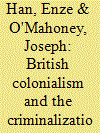

|
|
|
|
|
| Publication |
2014.
|
| Summary/Abstract |
What explains the global variation in laws criminalizing homosexual conduct? Recent research has claimed that British colonialism is largely responsible for the criminalization of homosexuality around the world. This article utilizes a newly constructed dataset that includes up-to-date data on 185 countries to assess this claim. We find that British colonies are much more likely to have criminalization of homosexual conduct laws than other colonies or other states in general. This result holds after controlling for other variables that might be expected to influence the likelihood of repressive lesbian, gay, bisexual and transgender (LGBT) rights legislation. However, we also find that the evidence in favour of the claim that British imperialism 'poisoned' societies against homosexuality is weak. British colonies do not systematically take longer to decriminalize homosexual conduct than other European colonies.
|
|
|
|
|
|
|
|
|
|
|
|
|
|
|
|
| 2 |
ID:
146517


|
|
|
|
|
| Summary/Abstract |
Ever since the introduction of the national political programme of “Building a new socialist countryside” (BNSC) in the early 2000s, renewed focus has been cast on how the Chinese government manages the gap between its rural and urban areas in the new millennium. Previous research has mostly studied the social and political consequences of the BNSC initiative without paying particular attention to its effects on public opinion. In this article, we present an analysis of the 2002 and 2008 waves of the mainland China subset of the Asian Barometer. Our results show a significant shift in the perceptions of the rural population in respect to how much impact government policies have on daily life. This shift brings rural perceptions more in line with those of the urban population in 2002. The paper concludes with the implications of our findings for the study of the relations between public opinion and public policy in China.
|
|
|
|
|
|
|
|
|
|
|
|
|
|
|
|
| 3 |
ID:
173464
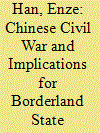

|
|
|
|
|
| Summary/Abstract |
Few studies on the legacies of the Chinese Civil War have examined its effects on state consolidation in the borderland area between China and mainland South-East Asia. This paper empirically examines the impact of the intrusion of the defeated Kuomingtang (KMT) into the borderland area between China, Burma and Thailand. In the People's Republic of China (PRC), the presence of the US-supported KMT across its Yunnan border increased the new communist government's threat perceptions. In response, Beijing used a carrot-and-stick approach towards consolidating its control by co-opting local elites while ruthlessly eliminating any opposition deemed to be in collusion with the KMT. In the case of Burma, the KMT presence posed a significant challenge to Burmese national territorial integrity and effectively led to the fragmentation of the Burmese Shan State. Finally, in Thailand, Bangkok collaborated with the Americans in support of the KMT to solidify its alliance relations. Later, Thailand used the KMT as a buffer force for its own border defence purposes against a perceived communist infiltration from the north. This paper contextualizes the spill-over effects of the Chinese Civil War in terms of the literature on how external threats can potentially facilitate state consolidation.
|
|
|
|
|
|
|
|
|
|
|
|
|
|
|
|
| 4 |
ID:
101852
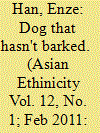

|
|
|
|
|
| Publication |
2011.
|
| Summary/Abstract |
As one of China's five autonomous regions, Inner Mongolia has not been highlighted in the international news, and the Mongols have not demonstrated significant political will for greater autonomy in the way the Tibetans and the Uighurs have in recent decades. Why haven't the Mongols mobilized? This paper argues that the Mongols' lack of aspiration for greater autonomy is in part due to the relationship between Inner Mongolia and Mongolia as an independent kin state. The different trajectories of national identity construction in these two places and the perception of better living conditions in Inner Mongolia have made the Inner Mongols less anxious about their current incorporation within the Chinese state.
|
|
|
|
|
|
|
|
|
|
|
|
|
|
|
|
| 5 |
ID:
170376
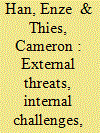

|
|
|
|
|
| Summary/Abstract |
This paper empirically tests bellicist theories of state building in the East Asian context, paying attention to the interplay between external threats and internal challenges and their implications for these states’ extractive power. How much variation in state building in the region can be attributed to war and war preparation as a result of both external threats and internal challenges? In particular, it provides more fine-grained analysis on the different types of internal challenges and their impact on state capacity building. The article argues that in the East Asia region, both external threats and internal challenges are crucial to explaining the variation in state capacity across the region. However, we also find that different types of internal challenges have different effects. Particularly, communist insurgencies seem to have both an immediate and long-term positive effect in compelling the state to respond with more extraction to engage in state-building efforts.
|
|
|
|
|
|
|
|
|
|
|
|
|
|
|
|
| 6 |
ID:
152473
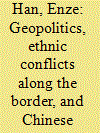

|
|
|
|
|
| Summary/Abstract |
Ever since Myanmar reoriented its foreign policy as a result of its transition to democratic rule in 2010, it has significantly improved its relations with the West, particularly the United States. Amid heightened geostrategic competition between the U.S. and China, how can we understand the Chinese government’s changing approaches to Myanmar, where China’s strategic and economic interests face unprecedented pressure? This article examines those changes in the context of the Chinese government’s response to three militarized ethnic conflicts along its border with Myanmar before and after Myanmar’s foreign policy reorientation. Drawing evidence from Chinese Ministry of Foreign Affairs statements and Chinese media coverage of the 2009 and 2015 Kokang conflicts and the 2011-2013 Kachin conflict, the article argues that combined geopolitical changes and domestic nationalist signaling explain the variations of China’s foreign policy approaches to Myanmar. The article thus contributes to ongoing interest in China’s foreign policy approaches to Southeast Asia in the wake of geostrategic competition between China and the United States.
|
|
|
|
|
|
|
|
|
|
|
|
|
|
|
|
| 7 |
ID:
130271
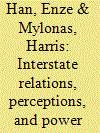

|
|
|
|
|
| Publication |
2014.
|
| Summary/Abstract |
Why do multi-ethnic states treat various ethnic groups differently? How do ethnic groups respond to these state policies? We argue that interstate relations and ethnic group perceptions about the relative strength of competing states are important-but neglected-factors in accounting for the variation in state-ethnic group relations. In particular, whether an ethnic group is perceived as having an external patron matters a great deal for the host state's treatment of the group. If the external patron of the ethnic group is an enemy of the host state, then repression is likely. If it is an ally, then accommodation ensues. Given the existence of an external patron, an ethnic group's response to a host state's policies depends on the perceptions about the relative strength of the external patron vis-à-vis the host state and whether the support is originating from an enemy or an ally of the host state. We present five configurations and illustrate our theoretical framework on the eighteen largest ethnic groups in China from 1949 to 1965, tracing the Chinese government's policies toward these groups, and examine how each group responded to these various nation-building policies.
|
|
|
|
|
|
|
|
|
|
|
|
|
|
|
|
| 8 |
ID:
172696
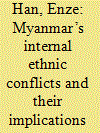

|
|
|
|
|
| Summary/Abstract |
This paper discusses the dynamics between Myanmar’s peace process, its mismanagement of the Rohingya crisis, and China’s strategic interests in Myanmar. It examines how internal ethnic conflicts in Myanmar will transpire and the implications for China’s grand strategy of One Belt One Road in the region.
|
|
|
|
|
|
|
|
|
|
|
|
|
|
|
|
| 9 |
ID:
171024
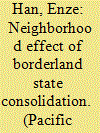

|
|
|
|
|
| Summary/Abstract |
This article examines the process of state consolidation, or its failure, in a state’s borderland area with neighboring states in upland Southeast Asia. It proposes that we should conceptualize state consolidation as an interactive process heavily influenced by a “neighborhood effect.” It argues that we should look at how state consolidation in one country’s borderland area can be influenced by the same process in the neighboring states. In particular, the article probes under what conditions the neighborhood effect of state consolidation might take place. It argues that the effect is more profound in situations where there is power asymmetry between neighboring states, and the extent of such effect is further conditioned upon the nature of relations among these states. Empirically, this article uses a set of comparative case studies Myanmar’s modern history of state consolidation in its borderland area to illustrate the proposed theoretical framework. Differentiating between the country’s eastern borders with China and Thailand vs. its western borders with Bangladesh and India, the article empirically examines Myanmar’s state consolidation processes to illustrate the theoretical framework, focusing on variations of power balance and nature of relations between the country and its neighbors since the end of World War II.
|
|
|
|
|
|
|
|
|
|
|
|
|
|
|
|
| 10 |
ID:
192541
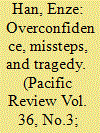

|
|
|
|
|
| Summary/Abstract |
This paper makes a novel contribution by examining the puzzle of one Southeast Asian nation, Myanmar, and its dramatic shift of ‘fortune’ in its international status and the domestic consequences of that shift during the decade of 2010–2020. It highlights how the country’s changing international relations affected its domestic political decision-making process. It puts forth the argument that the amount of international attention the country received since 2011 as the target of competitive courtship between China, United States, and the West in general, and the consequent feeling of being valued as a geostrategic asset, created strong conditions for overconfidence on part of Myanmar’s government and military. This favorable international environment also coincided with perceived progress in democratization domestically. Similar to its past patterns of behavior toward ethnic minorities, the Myanmar military and the government overestimated their likelihood of success in dealing with the Rohingya minority while underestimating the likelihood of punishment by the international community.
|
|
|
|
|
|
|
|
|
|
|
|
|
|
|
|
| 11 |
ID:
191675
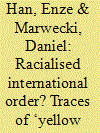

|
|
|
|
|
| Summary/Abstract |
This article explores how racial prejudice in the West forms at least part of the ideational foundation in how the rise of China has been perceived, and how such racial prejudices to some extent inflate people’s threat perception and hinders acceptance of any future Chinese hegemony. The article focuses on the leading European power, Germany, and provide a discourse analysis of the contemporary German popular media’s portrayal of China, China’s rise and how the vestiges of racial prejudice continue to define the German public’s view of China. It focuses on an analysis of a small yet representative sample of mainstream media and expert literature in Germany, so as to discern how ‘the rise of China’ is discussed in the German public sphere and the persistence of the ‘Yellow Peril’ trope. This article contests that all the elements that make up the perception of the ‘Yellow Peril’ have persisted, albeit in subtler ways. It argues that the more the literature adheres to the idea of a ‘Yellow Peril,’ the more it tends to perceive the international order in terms of a quasi-natural competition between nations. The article argues that as a non-Western non-White nation, China’s rise has been heavily racialised.
|
|
|
|
|
|
|
|
|
|
|
|
|
|
|
|
| 12 |
ID:
192111
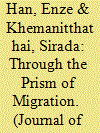

|
|
|
|
|
| Summary/Abstract |
This article studies contemporary Chinese engagement with Thailand in the context of migration. It argues the past of Chinese migration to Thailand shapes how the contemporary bilateral relations is perceived. In the context of Chinese engagement with Thailand, we should keep in mind the long history of Chinese migration and at times hostile policies the Thai government implemented to deal with such large numbers of migrants. Anti-China rhetoric thus has historical roots in the Chinese migration experience in Thailand, and one can argue that this history still frames some of the explicit or implicit Sinophobia within contemporary Thai society. Such historical legacies and the peculiar status of the Sino-Thai thus have created a varied reaction towards the recent Chinese presence in Thailand.
|
|
|
|
|
|
|
|
|
|
|
|
|
|
|
|
| 13 |
ID:
123714
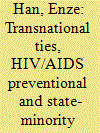

|
|
|
|
|
| Publication |
2013.
|
| Summary/Abstract |
This paper depicts the transnational ethnic and religious ties between China and Southeast Asia and examines the cultural, political and economic implications for state-minority relations in Southwest China. It documents how transnational ethnic and religious ties facilitate cultural revival among the ethnic Dai people in Southwest China and examines the impact of Buddhist networks on local governance. In particular, it portrays the cooperative relationship between the Chinese state and the Buddhist Sangha on social issues such as HIV/AIDS prevention and care. The paper argues that the Chinese state is more willing to cooperate with transnational ethnic and religious groups when the latter can help improve local governance and generate economic development, under the condition that they do not challenge the state's ultimate legitimacy and authority.
|
|
|
|
|
|
|
|
|
|
|
|
|
|
|
|
| 14 |
ID:
158259
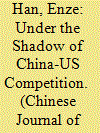

|
|
|
|
|
| Summary/Abstract |
With the U.S. and China competing for influence in Southeast Asia, how secondary states in the region make their foreign policy choices has come under more scrutiny. It seems secondary states in the region have exerted strong will and capacity to maintain significant amount of freedom in choosing their foreign policy orientations, rather than being totally dictated by the great powers. This paper presents a detailed paired comparison of Myanmar and Thailand’s alignment policies and their consequences since the end of World War II. The paper argues that international structural factors certainly constrain the options for secondary states, but domestic politics often play a significant role in how political leaders make the alignment choices they do, which is heavily conditioned by how these leaders derive their political legitimacy. Thus, to explain the alignment choices of secondary states in Southeast Asia, we need to pay more attention to the intertwined nature between domestic political contestation and foreign policy making.
|
|
|
|
|
|
|
|
|
|
|
|
|
|
|
|
|
|
|
|
|